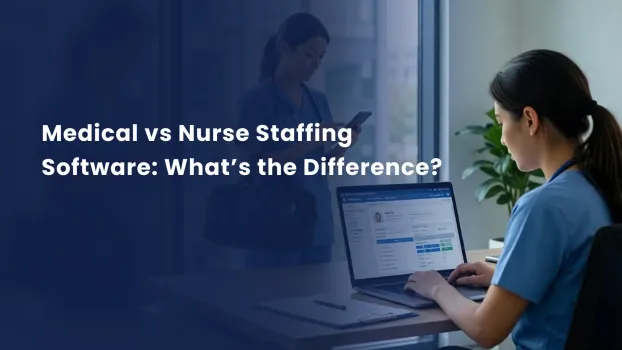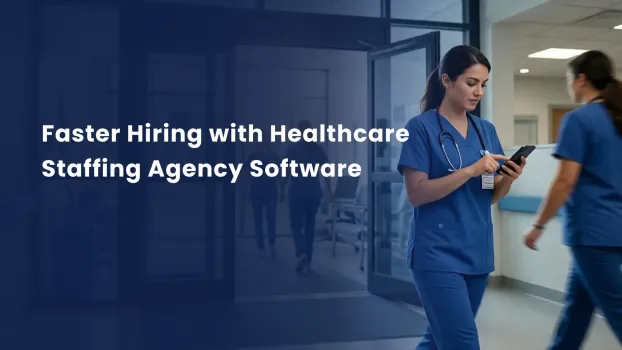AI integration in business is no more just a good to have factor rather it is a necessity today to stay competitive and fuel innovation by freeing up employees from mental burnout and multiple tasks at hand. Not to replace jobs but to stand out in the competition, a mix of AI and humans is a must. The workflow automation not only leads to faster processing but in some cases it is about high ROI, solid foundation, simplifying procedures, and higher user retention as well.
Smart business applications these days are full of AI integration. At WebOconnect, we have built numerous custom AI solutions in Germany for sectors like healthcare, fintech, assistive tech, and much more creating a space for more inclusivity and putting AI to use at less appealing jobs as well.
What is AI Integration in Business
AI integration in business is the process of adding the intelligent algorithm to the basis of data. AI workflow automation is the new backbone of the business, from web to mobile apps, and even in internal systems, these AI tools truly integrate the artificial intelligence software for business and facilitate decision-making, and customer interactions.
Further, AI integration in business creates an inseparable layer of tech stack that quietly analyzes data, automates tasks, and delivers smart UI/UX. The true smart business applications includes product and technology level with:
Native embedding
AI integration in business is seamless, and built smoothly ensuring integration with various APIs and business logic. The digital touchpoint is reliable and consistent.
Real-time adaptation
Artificial intelligence software for business leads to applications with instantly adjusting content, facilitating AI workflow automation, and creating user-intent based UX.
Transparent decisions flow
AI app development includes explanatory tools, make every AI workflow automation simple and helps.in easy interpretation for compliance and build user trust.
Modular & scalable architecture
Smart business applications are designed to scale, update or expand support updated independently keeping your tech stack future proof.
Security
AI integration in business needs advanced security and adaptive authentication at every level with business assets.
Benefits of AI Workflow Automation
Data Security
AI integration in business facilitates advanced threat management and real-time monitoring with adaptive authentication.
Importance - For businesses sensitive data and business assets need proper protection reducing the risk of fraud & breach.
Better User Retention
Artificial intelligence software for business facilitates timely delivery, recommendation and unlimited support for keeping the users engaged. AI integration in business responds after analysing user behaviour and reduces churn providing higher user retention.
Importance - AI app development is comparatively affordable and increases revenue stability.
Improved Operations
AI integration in business results in automation facilitating better decision- making with real time data updates and freeing up employees for a more critical, creative and strategic approach.
Importance - After AI teams are more dedicated to innovation and accuracy increasing productivity and growth.
Predictive Analysis
Smart business applications are predictive as they work based on data derived by past experience and understand the trends better and proactively as compared to humans.
Importance - AI integration in business bridges the gap between demand and supply reducing waste, managing cash flow, and generating EOQ without manual intervention.
Step-by-Step Process AI integration in business
AI integration in businesses requires a layered approach backed by the enterprise goals and focused towards achieving them. The AI workflow automation starts with finding inefficiencies, searching loopholes, developing potential machine learning touchpoints, and keep monitoring.
Further, AI integration in business is beyond the focus on core business functions, rather more on the NLP for building predictive models that forecasts demand. Also, the need of the era is to focus on data governance, ethical AI design, and algorithmic accountability as well.
Spot High Impact Workflows
Initiate AI workflow automation with focusing on the exercises like process mining, task analytics, surface latency, and more. Generally, manual intervention or unstructured data is where the high impact areas exist. The same bottlenecks are common. Therefore creating the need for artificial intelligence software for business in understanding customer behavior, think underwriting and processing faster and in accordance with the same.
After you spot these areas/zones, rate them as per ROI and effort taken in the operation or just follow the Model Readiness Index. Target areas/zones where AI integration helps in speed, accuracy and scalability. Prioritize workflows with measurable baselines so the post-integration uplift is quantifiable and justifiable.
Focus on Data Quality and Compliances
Smart business applications built with AI have lesser credibility when it comes to maintaining data quality and focusing on the compliances.
Further compliance with GDPR, HIPAA, or industry-specific policies enhances the credibility and helps in successful B2B sales building.
Choose the Right Tech Stack
The most critical decision with any development is concerned with tech stack choice, whether AI integrated or not. Initiate with mapping out the industry based constraints such as compute load, interoperability, and deployment topology.
Use edge-compute frameworks for lightweight models. However, for scalable ones, use Ray or Horovod. Also, focus on ML Ops platforms such as MLflow or Kubeflow to keep versions tracks and enhance model reproducibility.
Prototype and Validate
Use synthetic or de-identified production data to build prototypes. Deploy the rapid experiment framework such as PyCaret or Hugging Face Transformers leading to hypothesis testing without full pipeline commitment.
Stress test your products before deployment to check robustness under anomalous inputs. Keep validation as a continuous check point with model behavior, user feedback, and impact. The goal is to keep the model consistent under operational constraints.
Onboard Professionals
Hire dedicated resources for AI integration in businesses with going beyond just the algorithms and opting for the right people. Blending ML engineers, AI experts, data analysts, and project managers with technical expertise.
Prioritize hiring vision sharers not only coders . Opt for Dev-AI-Ops culture to bridge the gap and monitor drift as well retrain threshold by upskilling or rotation in in-house teams or hire dedicated resources. One can also look for outsourcing opportunities.
If you are looking to hire dedicated resources or outsourcing your AI software development, connect with WebOConnect today.
See How AI Workflow Automation Helps
AI app development is not restricted to a few AI-driven workflow automation like streamlining linear tasks for faster operations. The introduction of high tech such as NLP models, structured inputs, computer paired vision etc is highly recommended as well. Also, with higher traceability, AI is more like an invisible layer in the operational cognition.
Custom AI Solutions in Germany
With WebOConnect build custom AI solutions in Germany and witness the real power of AI workflow automation. Hire dedicated developers with AI expertise or outsource AI integration in business in the most affordable, qualitative, and productive way possible.
Why WebOConnect for app development in Germany?
- Scale whenever required with no long term commitment.
- Choose developers you need based on experience, expertise, and tech stack.
- Calculate cost before you connect with us using our hire Indian developers calculator
- Weekly Reporting to keep you updated on the progress and avoid delays.
If you are looking for the AI integration in business or Custom AI Solutions in Germany, consult with us today and witness your vision coming true.
FAQs
Q. Which sector needs AI integration?
A. Every sector today needs AI integration into businesses to enhance the working quality and faster results. Artificial intelligence software for businesses is widely used in logistics, manufacturing, customer support, fintech, ed-tech, etc. Contact WebOConnect today to understand if this is for your business.
Q. How is AI applied to business applications?
A. AI workflow automation strengthens data analysis and decision-making, improving customer experiences, generating content, optimizing IT operations, sales, marketing and cybersecurity. AI application is beyond what it was predicted years ago.
Q. What are the applications of AI in business intelligence?
A. AI in business intelligence refers to collecting data and structuring it for enhanced decision making. After mining data, the goal is to analyse the same to identify and understand the patterns, trends, and relationships. Also, AI predicts future needs by leveraging user behaviour.
Hiring for Speed vs Hiring for Scale: When to Use Dedicated Teams
.webp)

_thumb.webp)
_thumb.webp)















